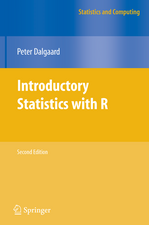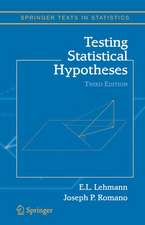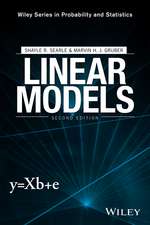Fundamentals of Queuing Systems: Statistical Methods for Analyzing Queuing Models
Autor Nick T. Thomopoulosen Limba Engleză Paperback – 13 apr 2014
| Toate formatele și edițiile | Preț | Express |
|---|---|---|
| Paperback (1) | 579.34 lei 43-57 zile | |
| Springer – 13 apr 2014 | 579.34 lei 43-57 zile | |
| Hardback (1) | 642.03 lei 43-57 zile | |
| Springer – 27 mar 2012 | 642.03 lei 43-57 zile |
Preț: 579.34 lei
Preț vechi: 681.58 lei
-15% Nou
Puncte Express: 869
Preț estimativ în valută:
110.89€ • 120.49$ • 93.21£
110.89€ • 120.49$ • 93.21£
Carte tipărită la comandă
Livrare economică 21 aprilie-05 mai
Preluare comenzi: 021 569.72.76
Specificații
ISBN-13: 9781489992031
ISBN-10: 1489992030
Pagini: 200
Ilustrații: XVIII, 182 p.
Dimensiuni: 155 x 235 x 11 mm
Greutate: 0.29 kg
Ediția:2012
Editura: Springer
Colecția Springer
Locul publicării:New York, NY, United States
ISBN-10: 1489992030
Pagini: 200
Ilustrații: XVIII, 182 p.
Dimensiuni: 155 x 235 x 11 mm
Greutate: 0.29 kg
Ediția:2012
Editura: Springer
Colecția Springer
Locul publicării:New York, NY, United States
Public țintă
ResearchCuprins
Introduction.- Preliminary Concepts.- One Server, Infinite Queue (M/M/1).- One Server, Finite Queue (M/M/1/N).- One Server, No Queue (M/M/1/1).- Multi Servers, Infinite Queue (M/M/k).- Multi Servers, Finite Queue (M/M/k/N).- Multi Servers, No Queue (M/M/k/k).- One Server, Arbitrary Service (M/G/1).- 2 Populations, One Server, Arbitrary Service (M/G/1/2).- M Machines, One Repairman (M/M/1/M).- M Machines, R Repairmen (M/M/R/M).- One Server, Repeat Service (M/M/1/q).- Multi Servers, Repeat Service (M/M/k/θ).- Tandem Queues (M/M/1 : M/M/1).- Priority System, One Server, Infinite Queue (M/M/1//P).- Priority, One Server, Arbitrary Service (M/G/1/P).- One Server, Constant Service (M/D/1).- Exponential Arrivals, Erlang Service (M/E2/1).- Erlang Arrivals, Exponential Service (E2/M/1).- Erlang Arrivals, Erlang Service (E2/E2/1).- Waiting Time Density, One Server (M/M/1).- Waiting Time Density, Multi Servers (M/M/k).- Bibliography.- Problems.- Solutions.
Recenzii
From the reviews:
“Fundamentals of Queuing Systems: Statistical Methods for Analyzing Queuing Models is a queuing theory book with practitioners as its target audience. … the consideration of a number of special cases permits the author to provide tailored solutions to specific problems, an ideal situation for the reader who is looking for some formulae for those problems. … Many real-world numerical examples are scattered throughout the book to provide the reader with opportunities to see how the formulae work.” (David Hodge, Interfaces, Vol. 43 (6), November-December, 2013)
“Fundamentals of Queuing Systems: Statistical Methods for Analyzing Queuing Models is a queuing theory book with practitioners as its target audience. … the consideration of a number of special cases permits the author to provide tailored solutions to specific problems, an ideal situation for the reader who is looking for some formulae for those problems. … Many real-world numerical examples are scattered throughout the book to provide the reader with opportunities to see how the formulae work.” (David Hodge, Interfaces, Vol. 43 (6), November-December, 2013)
Notă biografică
Nick T. Thomopoulos is a professor emeritus at the Illinois Institute of Technology. He is the author of four books, including Quantitative Methods Along the Supply Chain (Atlantic Publishers, 2011). He has over 100 published papers and presentations to his credit, and for many years, he has consulted in a wide variety of industries in the United States, Europe, and Asia. He has been the recipient of numerous honors, such as the Rist Prize in 1972 from the Military Operations Research Society for new developments in queuing theory, the Distinguished Professor Award in Bangkok, Thailand in 2005 from the IIT Asian Alumni Association, and the Professional Achievement Award in 2009 from the IIT Alumni Association.
Textul de pe ultima copertă
Waiting in lines is a staple of everyday human life. Without really noticing, we are doing it when we go to buy a ticket at a movie theater, stop at a bank to make an account withdrawal, or proceed to checkout a purchase from one of our favorite department stores. Oftentimes, waiting lines are due to overcrowded, overfilling, or congestion; any time there is more customer demand for a service than can be provided, a waiting line forms. Queuing systems is a term used to describe the methods and techniques most ideal for measuring the probability and statistics of a wide variety of waiting line models. This book provides an introduction to basic queuing systems, such as M/M/1 and its variants, as well as newer concepts like systems with priorities, networks of queues, and general service policies. Numerical examples are presented to guide readers into thinking about practical real-world applications, and students and researchers will be able to apply the methods learned to designing queuing systems that extend beyond the classroom. Very little has been published in the area of queuing systems, and this volume will appeal to graduate-level students, researchers, and practitioners in the areas of management science, applied mathematics, engineering, computer science, and statistics.
Caracteristici
Provides timeless methods for measuring statistics and probabilities in a vast range of queuing systems Presents information that is critical for professionals, researchers, and students in management science Features a tested format without difficult mathematical formulas or equations Each of the 23 chapters includes useful examples, problems and solutions Includes supplementary material: sn.pub/extras















